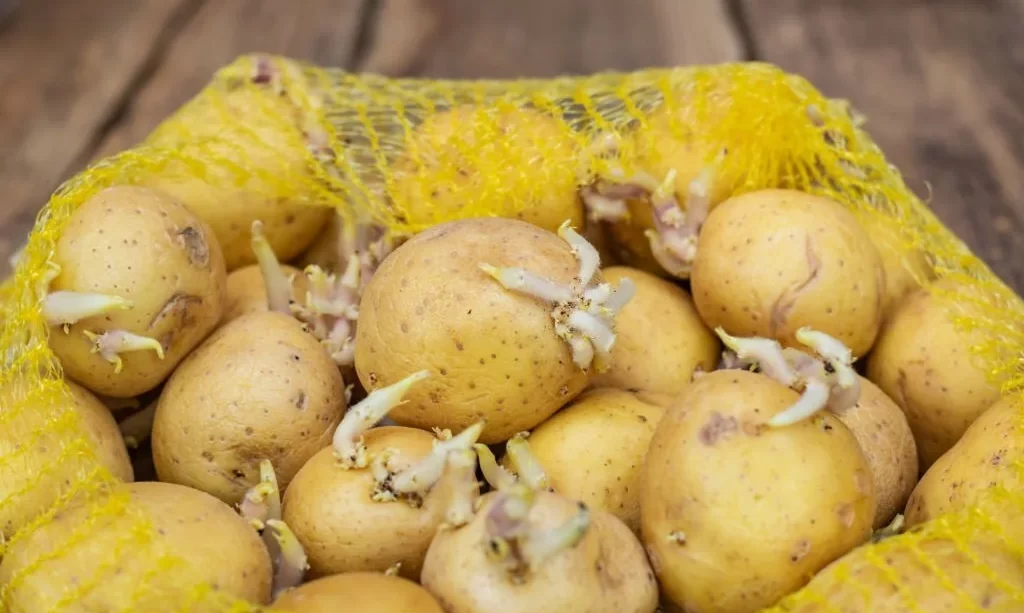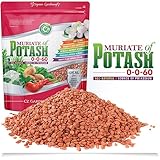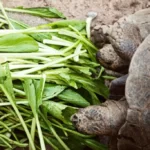When you reach into your pantry or kitchen storage, it’s not uncommon to discover a few potatoes that have sprouted unexpected green shoots. These sprouts can be a cause for curiosity and even concern for some gardeners. After all, potatoes are typically grown from seed potatoes or cuttings, not from the ones you meant to cook for dinner. In this article, we will explore the intriguing world of sprouted potatoes and answer a question that often arises: Can you plant a sprouted potato and expect it to grow into a healthy potato plant? We’ll delve into the science behind sprouting, examine the transformation of spuds with sprouts, and clarify whether planting sprouted potatoes is a viable and rewarding gardening endeavor.
- Simply Seed – Fresh 2024 Seed for Fall Planting –
- Non GMO And Packed In Organtic Peat Moss
- Top quality Tubers Are Hand Selected And Packaged Once Order Is Placed
- Receive 5 Full Pounds Of Beautiful Russet Burbank Potatoes.
- Order Now So You Can Have Fresh Potatoes From Your Garden For Your Family
Sprouted Potatoes
To understand the potential of sprouted potatoes, it’s essential to comprehend why potatoes sprout in the first place. Potatoes are naturally inclined to sprout, as it’s part of their growth cycle. When stored in the right conditions (cool, dark, and with adequate humidity), potatoes remain dormant. However, when exposed to warmth and light, they initiate sprouting as a survival mechanism. The sprouts, often referred to as “eyes,” contain the necessary nutrients for a young potato plant to establish itself. These sprouts typically emerge from the “eyes” of the potato, which are small depressions on its surface. As potatoes age, the energy stored within them is directed toward these sprouts, resulting in the visible growth of green shoots.
Can You Plant Sprouted Potatoes?
The question that often perplexes gardeners is whether it’s acceptable to plant sprouted potatoes. The answer is a resounding “yes”. In fact, sprouted potatoes can be planted, and they have the potential to yield viable potato plants. While the sprouts themselves are a sign of aging in the potato, they also indicate the presence of stored energy and the desire of the potato to grow. Planting sprouted potatoes can save both money and resources, as it transforms potentially wasted food into a valuable gardening opportunity. This practice not only reduces waste but also allows gardeners to witness the life cycle of a potato, from dormant tuber to flourishing plant.
The Planting Process
Planting sprouted potatoes is a straightforward process that can yield gratifying results. To begin, select potatoes with well-developed sprouts, ensuring they are not mushy or rotten. The planting site should offer well-draining soil, as waterlogged soil can cause rotting. Start by digging a trench or individual holes, approximately 3-4 inches deep. Space the potato pieces about 12 inches apart, ensuring each piece contains at least one sprout. If the potato is large, it can be cut into pieces, each with a sprout, to maximize planting potential. Cover the potatoes with soil and water them thoroughly to settle the soil.
- 🌳 PROFESSIONALLY MIXED IN THE USA – Each bag is hand blended on our small family farm with premium horticultural grade ingredients: Coco Coir, Canadian Peat Moss, Perlite, Worm Castings- 1 QUART BAG
- ✅ PROMOTES RAPID ROOT DEVELOPMENT: With extra perlite and low-salt coconut coir, GARDENERA soil promotes rapid root development .
- 💧 SUPER MOISTURE DRAINAGE- Protects roots by quickly draining away excess water but keeping dirt moist for nutrient retention, best mimics their natural outdoor environment.
- ✅ APPROVED FOR ORGANIC GROWING: All Gardenera Organics premium potting soils are made in the USA 🇺🇸 and contain no additives, proving them great for use in organic growing.
- 🌱 DEVELOPED BY PLANT PARENTS FOR PLANT PARENTS – Crafted specifically to support the growth of Potatoes. This high quality hand crafted mix is great for Potatoes. It will allow your plant to grow and become large and healthy.
Caring for Sprouted Potato Plants
Caring for sprouted potato plants involves providing them with the right conditions to thrive. Regular watering is crucial, ensuring the soil remains consistently moist but not waterlogged. Fertilization is also essential, as potatoes are heavy feeders. Apply a balanced fertilizer or compost to provide the necessary nutrients for robust growth. As the potato plants grow, consider hilling soil around the base of the plants. Hilling helps support the growing tubers, prevents greening due to sunlight exposure, and promotes better yields. Keep an eye out for potential pests and diseases, and take appropriate measures to address any issues promptly.
- PREMIUM QUALITY INGREDIENTS – Cz Garden Muriate of Potash is a water soluble, high purity, premium phosphate fertilizer for all indoor/outdoor flowers, lawn, and garden vegetables.
- POWERFUL POTASSIUM FERTILIZER highly concentrated potassium supplement designed to increase the density of your flowers and fruits. Potassium is a catalyst for carbohydrate metabolism and aids in the synthesis of proteins and amino acids. Adding high levels of potassium may lead to thicker, heavier flowers with massive yields.
- RESEALABLE, EASY POUR PACKAGING: Cz Garden 0-0-60 Muriate of Potash fertilizer comes sealed in a 5lb, heavy duty resealable pouch. Pour the necessary quantity with ease and store the rest for future use.
- COUNTRY OF ORIGIN: USA – Cz Garden fertilizers and soil amendments are manufactured in the USA from the highest quality ingredients. Buy with confidence!
- Cz Garden Organics is committed to developing Premium Grade custom soil amendment blends, fertilizers, and nutrients for your organic garden.
Harvesting and Using Potatoes from Sprouted Tubers
Harvesting potatoes grown from sprouted tubers typically occurs when the plants have matured, and the foliage begins to yellow and die back. Carefully dig up the potato plants, taking care not to damage the tubers. The harvested potatoes may be smaller in size compared to those grown from traditional seed potatoes, but they are still delicious and usable. These homegrown potatoes can be used in a variety of culinary creations, from mashed potatoes to crispy roasted spuds. The satisfaction of cooking and savoring potatoes you’ve grown from sprouted tubers adds an extra layer of joy to your meals.
Conclusion
In conclusion, the sight of sprouted potatoes need not be a cause for concern or waste. Instead, it presents a unique opportunity to embark on a gardening adventure. Planting sprouted potatoes can yield healthy potato plants and a satisfying harvest. It’s an eco-friendly practice that reduces food waste and celebrates the natural inclination of potatoes to sprout and grow. By understanding the science behind sprouting, embracing the planting process, and providing proper care, you can transform sprouted spuds into a rewarding gardening endeavor. So, the next time you encounter sprouted potatoes in your kitchen, consider giving them a chance in your garden – you might be pleasantly surprised by the results.







